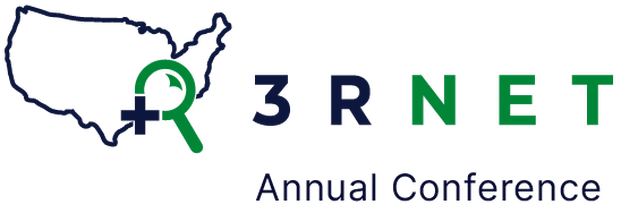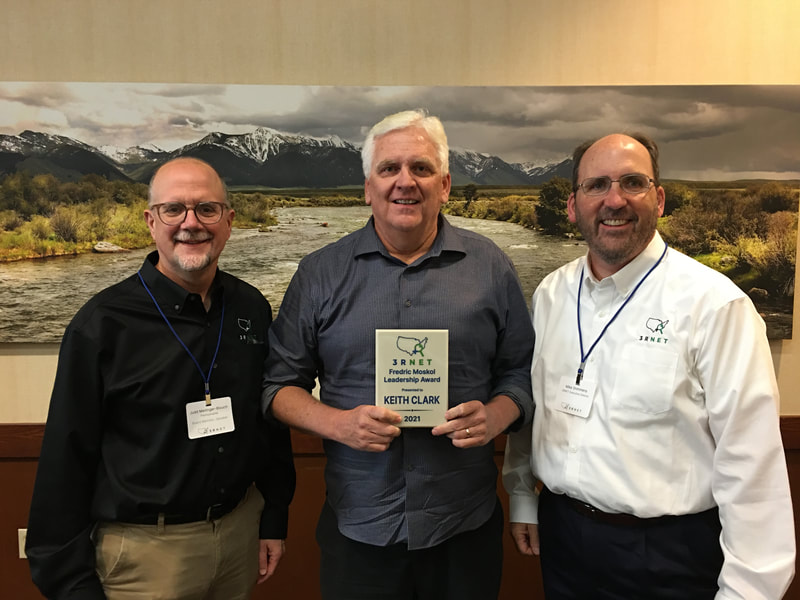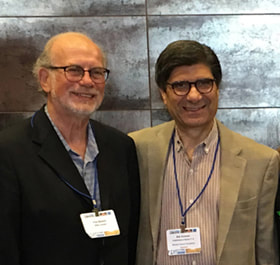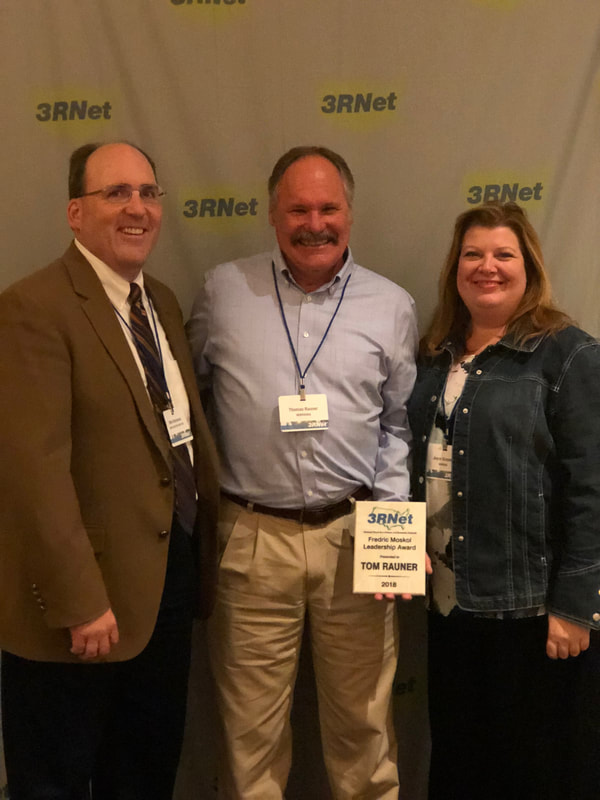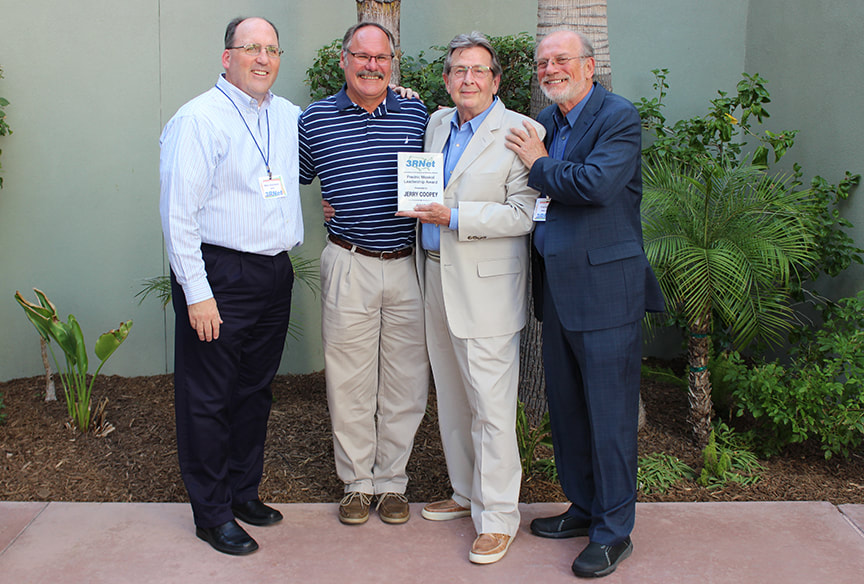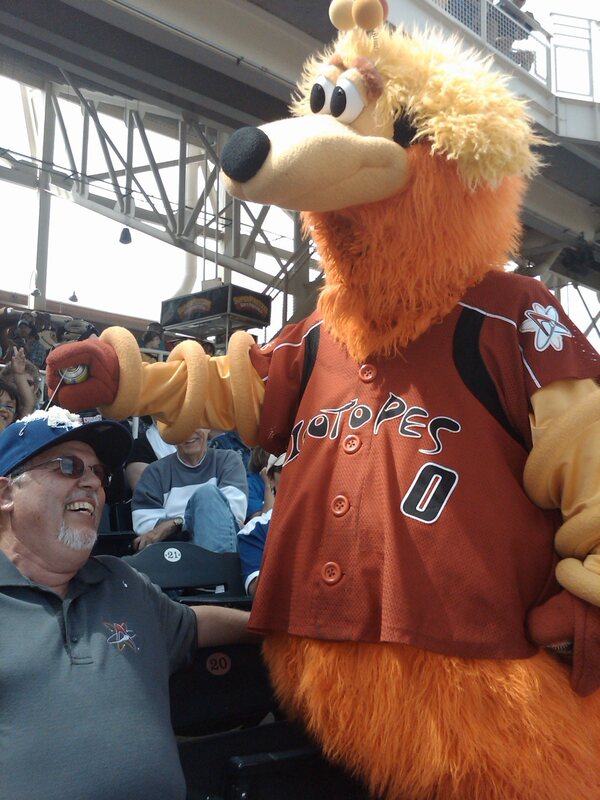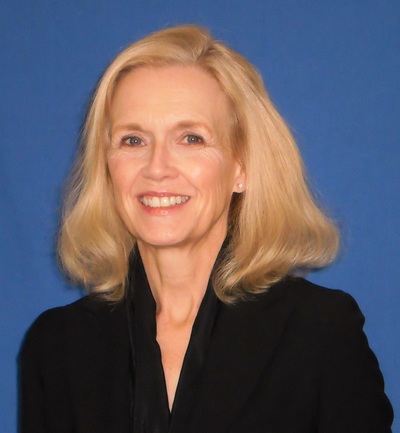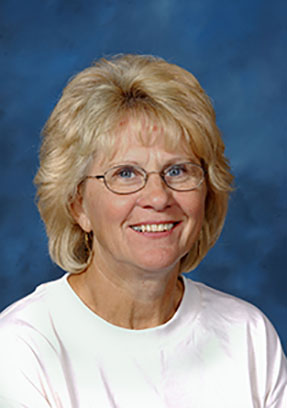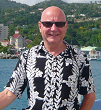Fredric Moskol 3RNET Leadership Award
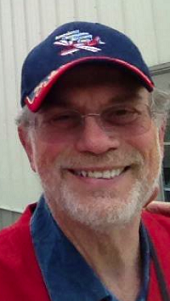
About the Moskol Leadership Award
The Fredric Moskol 3RNET Leadership Award is presented at 3RNET's Annual Conference to a person who possesses outstanding leadership abilities, supports the mission of 3RNET, responds compassionately to the healthcare needs of rural and underserved populations, and does so with a collaborative and compassionate spirit. 3RNET’s Board of Directors selects the Moskol Leadership Award recipient. The first Moskol Leadership Award was presented in 2013.
About Fred Moskol
Fred Moskol, the founding father of 3RNET, is a man of many talents, but is perhaps most recognized for his distinguished role in health care. Fred is a visionary and a man of determination who resolutely worked for more than twenty years to create a national healthcare recruitment organization to serve rural and underserved America.
While serving as the director of the Wisconsin Office of Rural Health and associate director of the Wisconsin AHEC at the University of Wisconsin, Fred lead the effort to create a national rural recruitment network primarily comprised of State Offices of Rural Health.
In 1995, after years of promoting and cajoling, the National Organization of State Offices of Rural Health (NOSORH) officially voted to support Freds’ idea of a national recruitment organization. In 1999, the National Rural Recruitment and Retention Network was incorporated, and Fred became the first executive director of 3RNET. He remained in this position until 2005.
The creation of a national recruitment organization, however, was anything but an easy birth. Fred experienced repeated rebuffs and rejections from organizations and individuals he deemed to be critical partners, partners that would need to work collaboratively if this organization was to be get off the ground and be successful. Refusing to be deterred, Fred embodied the words of Martin Luther King, Jr. who said, “A genuine leader is not a searcher for consensus but a molder of consensus.”
From the outset, Fred stressed that physician recruitment was all about community development and retention, two themes that continue to be at the epicenter of today’s recruitment efforts. In those early days, being an organizational member required having a phone and a person to answer it. t was as basic as that. But Fred recognized the critical role technology might play in the recruitment and retention effort and quickly embraced the use of the World Wide Web to help promote 3RNET to a wider audience. He created the first 3RNET website with the guidance of one of his staff members, a website that has evolved over the years but remains the primary working tool of 3RNET.
By the time Fred retired as Executive Director in 2005, 3RNET had:
The Fredric Moskol 3RNET Leadership Award is presented at 3RNET's Annual Conference to a person who possesses outstanding leadership abilities, supports the mission of 3RNET, responds compassionately to the healthcare needs of rural and underserved populations, and does so with a collaborative and compassionate spirit. 3RNET’s Board of Directors selects the Moskol Leadership Award recipient. The first Moskol Leadership Award was presented in 2013.
About Fred Moskol
Fred Moskol, the founding father of 3RNET, is a man of many talents, but is perhaps most recognized for his distinguished role in health care. Fred is a visionary and a man of determination who resolutely worked for more than twenty years to create a national healthcare recruitment organization to serve rural and underserved America.
While serving as the director of the Wisconsin Office of Rural Health and associate director of the Wisconsin AHEC at the University of Wisconsin, Fred lead the effort to create a national rural recruitment network primarily comprised of State Offices of Rural Health.
In 1995, after years of promoting and cajoling, the National Organization of State Offices of Rural Health (NOSORH) officially voted to support Freds’ idea of a national recruitment organization. In 1999, the National Rural Recruitment and Retention Network was incorporated, and Fred became the first executive director of 3RNET. He remained in this position until 2005.
The creation of a national recruitment organization, however, was anything but an easy birth. Fred experienced repeated rebuffs and rejections from organizations and individuals he deemed to be critical partners, partners that would need to work collaboratively if this organization was to be get off the ground and be successful. Refusing to be deterred, Fred embodied the words of Martin Luther King, Jr. who said, “A genuine leader is not a searcher for consensus but a molder of consensus.”
From the outset, Fred stressed that physician recruitment was all about community development and retention, two themes that continue to be at the epicenter of today’s recruitment efforts. In those early days, being an organizational member required having a phone and a person to answer it. t was as basic as that. But Fred recognized the critical role technology might play in the recruitment and retention effort and quickly embraced the use of the World Wide Web to help promote 3RNET to a wider audience. He created the first 3RNET website with the guidance of one of his staff members, a website that has evolved over the years but remains the primary working tool of 3RNET.
By the time Fred retired as Executive Director in 2005, 3RNET had:
- Grown to include 44 members
- Published the Recruitment and Retention Manual
- Initiated Associate Membership
- Crafted a mission statement
- Begun doing an annual survey
2023 Moskol Leadership Award Recipient: Dr. Dave Schmitz
Pictured above (left to right) Stacy Kusler, 3RNET Board President; Dave Schmitz, Moskol Award Recipient, Mike Shimmens, 3RNET Executive Director.
Congratulations to our 2023 Fredric Moskol Leadership Award recipient, Dave Schmitz!
David Schmitz, MD, adds a leadership quality which sets him apart from previous Moskol Leadership Award recipients: he is a Family Medicine physician. In fact, his first interaction with 3RNET was when he was in medical school!
“I remember receiving a pre-stamped post card from 3RNET, where I checked off the boxes of states I was interested in,” he shared.
Since that first interaction with 3RNET, Dave’s support of and connection to 3RNET has been both longstanding and unwavering.
Dave grew up in a rural community outside of Buffalo, New York. He knew he wanted to do something in the science field but was leaning toward veterinary science until his eleventh grade chemistry teacher encouraged him to pursue medicine. He chose family medicine because, “I wanted to be a family doctor because I felt that would give me the most skills to help the most people. I think about how my skillset can help people. I have a specific memory of helping my grandfather get ready for work. I was taking his lunchbox out of the musty closet and he told me, ‘if you love your work you’ll never work a day in your life,’ and that’s always been the goal.”
After medical school, Dave completed his residency training at the Family Medicine Residency in Boise, Idaho. He chose this residency because he liked that the program required rural rotations. Having both grown up in a rural community and participating in rural-focused educational opportunities, Dave knew providing care to a rural community was where he wanted to practice medicine.
Interestingly, Dave shared it wasn’t exactly easy to get his first job as a Family Medicine physician, and his first job didn’t qualify for federal loan repayment. Despite these initial challenges, Dave knew the rural community in Idaho he was working in was well worth it, and he stayed there until he was recruited to work under his mentor, Ted Epperly, at his former residency.
“When I came back the residency where I had trained to work as rural faculty, Ted allowed me to grow there in a way that was very unique,” Dave shared.
In addition to training future Family physicians, Dave was delegated to assist with the initial Rural Training Track (RTT) cooperative agreement. Alongside Dr. Randy Longenecker, Dave helped with all the consults provided to rural training programs during the first six years of the initial RTT agreement.
Ted was also supportive of Dave when the opportunity presented itself for Dave to create the Community Apgar Project alongside Boise State University researcher Dr. Ed Baker.
“I was introduced to Ed through Mary Sheridan, (who was at the time the Idaho State Office of Rural Health Director). Mary and Laura Rowen, also at the SORH, were supporters of both Apgar and 3RNET. They were so instrumental in those early days of Apgar. I was interested in scope of practice, and with their support we were able to first present our research findings at a state level. From there, we were able to grow the program to a national level. We completed the CAP program in North Dakota, and were able to share these results with NOSORH, NRHA, and 3RNET,” Dave reflected.
The first Community Apgar Project research was completed in 2008. Today, it’s been done in many states, most recently in Pennsylvania through a partnership with the Pennsylvania SORH, the University of North Dakota, and 3RNET!
“Even the first study we did in Idaho was analogous to 3RNET. There’s a synergy and feedback loop between medical education and workforce – how to place people,” Dave said.
“In those early days, Tim Skinner would often be presenting on 3RNET when I was presenting at conferences around the nation. Years later, Mike Shimmens and Mark Barclay gave the Community Apgar Project so much support at 3RNET. And today, Stacy Kusler (North Dakota 3RNET Network Coordinator) is the most experienced person with CAP in the entire country,” Dave added.
Now the Chair of Family and Community Medicine at the University of North Dakota, Dave says,
“I’m fortunate to be where a majority of the students have a similar attitude. Yes, they want a job and want to make a living, but they want to do it in a way where they can make a difference.”
Dave’s dedication to and passion for rural are obvious and contagious. In closing, he shared with us part of why rural health means so much to him.
“The unseen strength in rural communities. Rural communities are full of people who care for each other. As long as we’ve got that, I feel like that is the ‘safety net’ and backbone of people struggling together to do the right thing with limited resources and against the odds. There’s no place to do that except in a community like that. That makes rural really special.”
Pictured above (left to right) Stacy Kusler, 3RNET Board President; Dave Schmitz, Moskol Award Recipient, Mike Shimmens, 3RNET Executive Director.
Congratulations to our 2023 Fredric Moskol Leadership Award recipient, Dave Schmitz!
David Schmitz, MD, adds a leadership quality which sets him apart from previous Moskol Leadership Award recipients: he is a Family Medicine physician. In fact, his first interaction with 3RNET was when he was in medical school!
“I remember receiving a pre-stamped post card from 3RNET, where I checked off the boxes of states I was interested in,” he shared.
Since that first interaction with 3RNET, Dave’s support of and connection to 3RNET has been both longstanding and unwavering.
Dave grew up in a rural community outside of Buffalo, New York. He knew he wanted to do something in the science field but was leaning toward veterinary science until his eleventh grade chemistry teacher encouraged him to pursue medicine. He chose family medicine because, “I wanted to be a family doctor because I felt that would give me the most skills to help the most people. I think about how my skillset can help people. I have a specific memory of helping my grandfather get ready for work. I was taking his lunchbox out of the musty closet and he told me, ‘if you love your work you’ll never work a day in your life,’ and that’s always been the goal.”
After medical school, Dave completed his residency training at the Family Medicine Residency in Boise, Idaho. He chose this residency because he liked that the program required rural rotations. Having both grown up in a rural community and participating in rural-focused educational opportunities, Dave knew providing care to a rural community was where he wanted to practice medicine.
Interestingly, Dave shared it wasn’t exactly easy to get his first job as a Family Medicine physician, and his first job didn’t qualify for federal loan repayment. Despite these initial challenges, Dave knew the rural community in Idaho he was working in was well worth it, and he stayed there until he was recruited to work under his mentor, Ted Epperly, at his former residency.
“When I came back the residency where I had trained to work as rural faculty, Ted allowed me to grow there in a way that was very unique,” Dave shared.
In addition to training future Family physicians, Dave was delegated to assist with the initial Rural Training Track (RTT) cooperative agreement. Alongside Dr. Randy Longenecker, Dave helped with all the consults provided to rural training programs during the first six years of the initial RTT agreement.
Ted was also supportive of Dave when the opportunity presented itself for Dave to create the Community Apgar Project alongside Boise State University researcher Dr. Ed Baker.
“I was introduced to Ed through Mary Sheridan, (who was at the time the Idaho State Office of Rural Health Director). Mary and Laura Rowen, also at the SORH, were supporters of both Apgar and 3RNET. They were so instrumental in those early days of Apgar. I was interested in scope of practice, and with their support we were able to first present our research findings at a state level. From there, we were able to grow the program to a national level. We completed the CAP program in North Dakota, and were able to share these results with NOSORH, NRHA, and 3RNET,” Dave reflected.
The first Community Apgar Project research was completed in 2008. Today, it’s been done in many states, most recently in Pennsylvania through a partnership with the Pennsylvania SORH, the University of North Dakota, and 3RNET!
“Even the first study we did in Idaho was analogous to 3RNET. There’s a synergy and feedback loop between medical education and workforce – how to place people,” Dave said.
“In those early days, Tim Skinner would often be presenting on 3RNET when I was presenting at conferences around the nation. Years later, Mike Shimmens and Mark Barclay gave the Community Apgar Project so much support at 3RNET. And today, Stacy Kusler (North Dakota 3RNET Network Coordinator) is the most experienced person with CAP in the entire country,” Dave added.
Now the Chair of Family and Community Medicine at the University of North Dakota, Dave says,
“I’m fortunate to be where a majority of the students have a similar attitude. Yes, they want a job and want to make a living, but they want to do it in a way where they can make a difference.”
Dave’s dedication to and passion for rural are obvious and contagious. In closing, he shared with us part of why rural health means so much to him.
“The unseen strength in rural communities. Rural communities are full of people who care for each other. As long as we’ve got that, I feel like that is the ‘safety net’ and backbone of people struggling together to do the right thing with limited resources and against the odds. There’s no place to do that except in a community like that. That makes rural really special.”
Past Moskol Award Recipients
2023 - Dave Schmitz - Read the full announcement here
2022 - Ann Cranford - Read the full announcement here
2021 - Keith Clark - Read the full announcement here
2019 - Bob Aronson - Read the full announcement here
2018 - Tom Rauner - Read the full announcement here
2017 - Jerry Coopey - Read the full announcement here
2016 - Jerry Harrison - Read the full announcement here
2015 - Jan Hurst - Read the full announcement here
2014 - Mary Amundson - Read the full announcement here
2013 - Tom Tucker - Read the full announcement here
2023 - Dave Schmitz - Read the full announcement here
2022 - Ann Cranford - Read the full announcement here
2021 - Keith Clark - Read the full announcement here
2019 - Bob Aronson - Read the full announcement here
2018 - Tom Rauner - Read the full announcement here
2017 - Jerry Coopey - Read the full announcement here
2016 - Jerry Harrison - Read the full announcement here
2015 - Jan Hurst - Read the full announcement here
2014 - Mary Amundson - Read the full announcement here
2013 - Tom Tucker - Read the full announcement here
